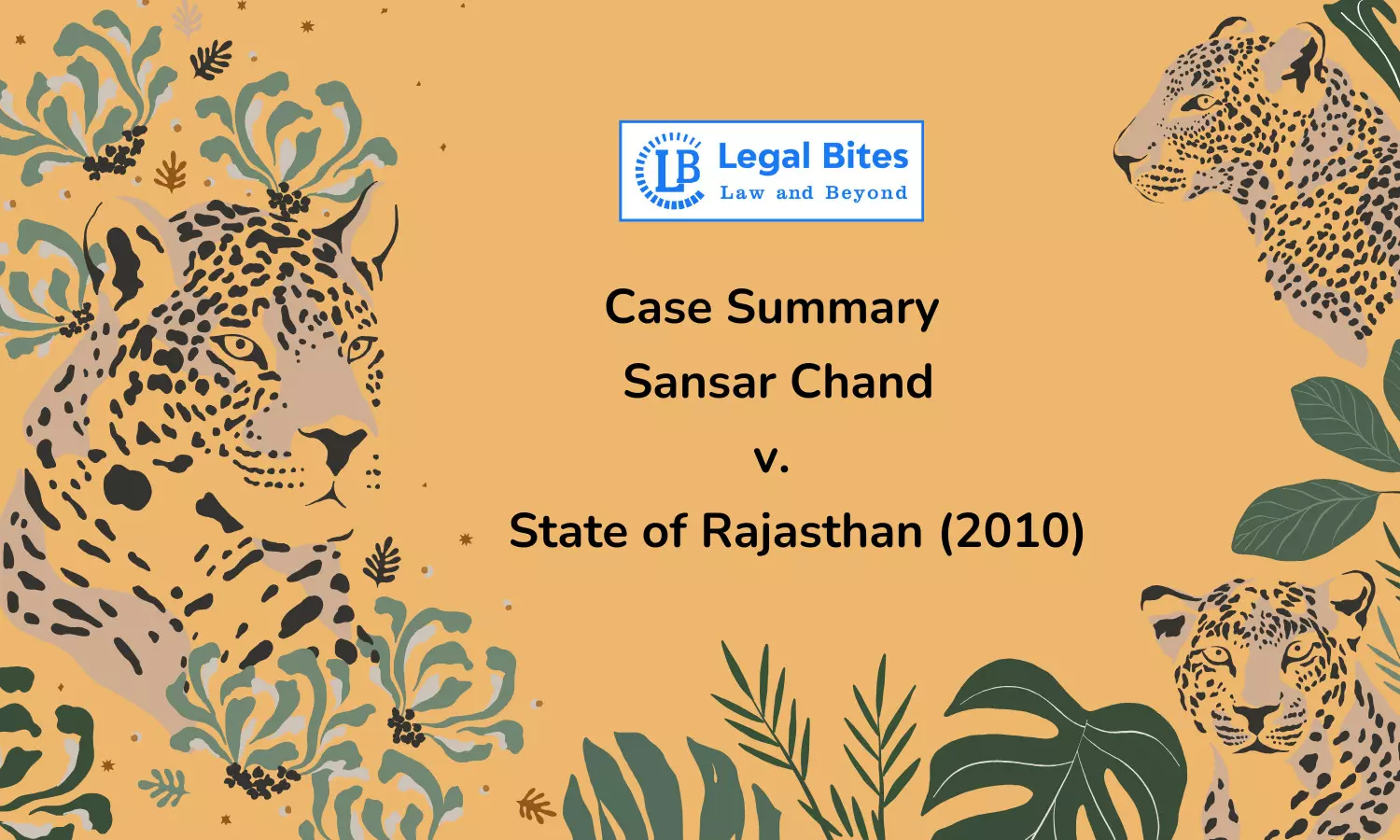Case Summary: Sansar Chand v. State of Rajasthan (2010) | Wildlife Trafficking
The Sansar Chand case is a stark reminder of the consequences of unchecked poaching and wildlife trafficking.

The case of Sansar Chand v. State of Rajasthan, Criminal Appeal No. 2024 of 2010, decided by the Supreme Court of India, highlights the gravity of wildlife crimes and their detrimental impact on India's ecological balance. Delivered by Justices Markandey Katju and T.S. Thakur, the judgment delves into the appellant's extensive involvement in wildlife trafficking. It emphasizes the need for stringent action to preserve the country's biodiversity. This analysis explores the case's legal, ecological, and societal dimensions.
Background
Sansar Chand, the appellant, was a habitual offender involved in the illegal trade of wildlife products for over three decades. His activities included poaching and trading skins and body parts of endangered species such as tigers and leopards. He operated through a well-organized smuggling network across borders, satisfying international demand for wildlife products, particularly in countries like China.
The case in question arose from the arrest of one Balwan, who was caught transporting leopard skins. During the investigation, Balwan disclosed that the skins were intended for Sansar Chand. This extra-judicial confession, corroborated by material evidence, formed the basis of Sansar Chand's conviction under the Wildlife (Protection) Act, 1972.
Issues
- Whether an extra-judicial confession can serve as the sole basis for conviction under the Wildlife (Protection) Act, 1972.
- Whether organized wildlife poaching and trade can be effectively addressed through stringent enforcement of existing laws.
Judgment and Legal Reasoning
The Court upheld the principle that extra-judicial confessions are admissible if corroborated by other evidence. In this case:
- Balwan's confession was voluntarily made and was not influenced by coercion.
- The confession was supported by documentary evidence, such as seizure records, and testimonies of witnesses like PW-11 (Arvind Kumar).
- Tools used for poaching and parts of animals were recovered based on Balwan’s statements, further validating the confession.
- Citing precedents like Thimma v. State of Mysore (AIR 1971 SC 1871) and Mulk Raj v. State of UP (AIR 1959 SC 902), the Court emphasized that extra-judicial confessions, when corroborated, can be the basis for conviction.
Role of Organized Crime
The Court noted that Sansar Chand operated as the leader of a criminal network. He did not engage directly in poaching but hired individuals to execute the killings. This modus operandi made it challenging to obtain direct evidence against him. The Court relied on circumstantial and corroborative evidence to establish his role.
Preservation of Wildlife
The judgment highlighted the critical role of the Wildlife (Protection) Act, 1972, in curbing such offences. Articles 48A and 51A(g) of the Constitution mandate the protection of wildlife and the environment. The Court lamented the decline in India's biodiversity, attributing it to poaching and organized wildlife crime.
Ecological and Societal Impact
The judgment underscored the ecological significance of wildlife preservation:
- Wildlife plays a crucial role in maintaining ecological balance. For example, the removal of carnivores disrupts food chains, leading to the overpopulation of herbivores and the depletion of vegetation.
- The loss of biodiversity endangers ecosystems, agricultural productivity, and human health.
- The Court emphasized the transnational nature of wildlife crimes. Products sourced from Indian wildlife were smuggled to countries like China, where they were used in traditional medicine and as luxury items. This international demand exacerbates the exploitation of India’s natural resources.
Impact on the Legal Framework
Strengthening Wildlife Laws
The Court called for stricter enforcement of the Wildlife (Protection) Act. It also recommended:
- Enhanced penalties for wildlife crimes.
- Better coordination among law enforcement agencies, including international collaborations, to dismantle transnational smuggling networks.
Role of Government and Society
The judgment urged Central and State Governments to actively preserve wildlife and enforce anti-poaching laws. It also called for societal awareness to reduce the demand for illegal wildlife products.
Case Significance
Legal Precedents
The case reaffirmed important principles regarding extra-judicial confessions and their admissibility in criminal trials. It also set a precedent for addressing organized wildlife crimes under the Wildlife (Protection) Act.
Awareness and Advocacy
The judgment brought attention to the critical state of India’s wildlife and the ecological consequences of poaching. It served as a clarion call for conservation efforts and stricter laws.
Conclusion
The Supreme Court’s judgment in Sansar Chand v. State of Rajasthan is a landmark ruling in wildlife conservation jurisprudence. It highlighted the interplay between organized crime, legal enforcement, and ecological preservation. The case underscores the urgent need for collective efforts by governments, law enforcement, and society to protect India's rich biodiversity for future generations.
By convicting Sansar Chand and emphasizing the broader ecological impact of wildlife crimes, the judgment sends a strong message against illegal wildlife trade, aligning with national and international commitments to biodiversity conservation.
Click Here to Read the Official Judgment

